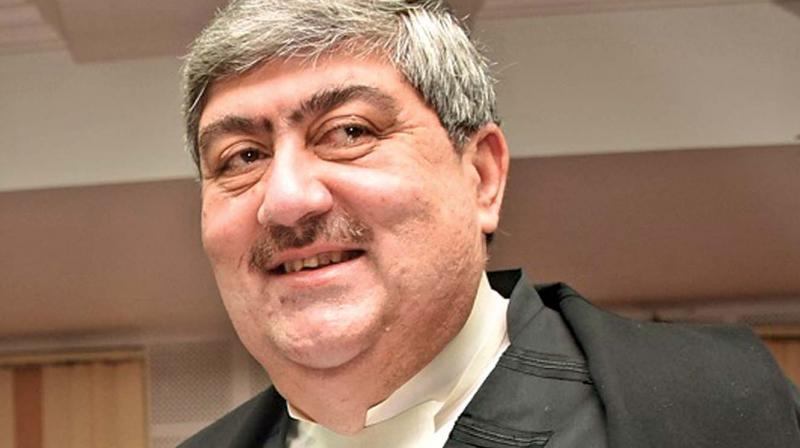Now Reading: In conversation with Justice SK Kaul on his journey to being Supreme Court judge, doing better lawyering & tips for law students
-
01
In conversation with Justice SK Kaul on his journey to being Supreme Court judge, doing better lawyering & tips for law students

In conversation with Justice SK Kaul on his journey to being Supreme Court judge, doing better lawyering & tips for law students
A native of Srinagar, Justice Sanjay Kishan Kaul was born on 26 December 1958. Kaul hails from the family of the Dattatreya Kauls of Srinagar. His great-great-grandfather, Raja Suraj Kishan Kaul, was the Revenue Minister in the Regency Council of the princely state of Jammu and Kashmir. His great-grandfather, Sir Daya Kishan Kaul, was a statesman and diplomat who served as the finance minister of Jammu & Kashmir state. His grandfather, Raja Upinder Kishen Kaul, had a distinguished career in public service. Justice Kaul’s brother, Neeraj Kishan Kaul, was also a judge of the Delhi High court, having been appointed in the summer of 2009.
After schooling in Modern School, New Delhi, Sanjay Kishan Kaul graduated in Economics (Hons.) from Delhi University, studying in St. Stephen’s College, Delhi. He then took a degree in law, studying at the Faculty of Law, University of Delhi, taking the LLB in 1982.
Notable Judgment:
- In the year 2017, on the 24th of August, Justice Kaul along with 8 other brother judges ruled in favour of Privacy being a Fundamental Right, which is a watershed moment in the history of Constitutional Jurisprudence of India.
- 2008 Judgement as Delhi HC Judge, where Kaul dismissed the charges levied against M F Hussain for his painting of a lady later termed as ‘Bharat Mata’, accusing him of obscenity. Upholding free speech and expression, Justice Kaul expressed agreement with Husain’s contention that there was no deliberate intention on his part to hurt anybody’s religious feeling as the figure actually represented an “anthropomorphic depiction of a nation” in the form of a distressed woman. Justice Kaul in his conclusion mentions,
Pluralism is the soul of democracy. There should be freedom for the thought we hate. Freedom of speech has no meaning if there is no freedom after speech. The reality of democracy is to be measured by the extent of freedom and accommodation it extends.
Pleased to share candid conversation with him as follows:
Q: Journey from law school to Supreme Court Sitting Hon’ble Judge?
A: It was a very long and adventurous journey. When I came from my law school I joined Khaitan & Co. and worked for 4 years. Law firm gave me guidance in drafting and research work. Then I begin with Independent practice and became counsel in Delhi HC for 14 years. I worked simultaneously with Justice Arun Kumar and Chief Justice of Rajasthan with Delhi based work. It was a fair opportunity of court practice and I worked for law firms as a counsel and outsourcing them was a switch over one year of practice. It was a liberal work opportunity, they had plenty of cases which was shared with me to appear and argue. It was a good exposure opportunity. I worked with law firms which were 50% of my work. I presided over Delhi HC as a Judge for 4 years. In Delhi, there are large opportunities for commercial practising. It gave me a great and fair court opportunity, I became a senior advocate in 1999 and in December 2000 my consent was asked for the Judgeship and it is said by the Great scholars that “Whenever you are offered Judgeship you should never refuse it.”
My only interest was to remain in Delhi and the system provided me assurance to me. My entire family was settled in Delhi only. I delivered justice for various jurisdictions which varied from appeals to service matters. I have sat over the matters which were new to me during my practice years like Tax and service matters.
Major matters were related to IPR and ADR. I presided as the Chief Justice of Punjab and Haryana for a tenure of 14 months with a very cooperation administrative system of bar and bench and appointed 14 judges as recommended by me in the course of elevation.
I presided as Chief Justice of Madras HC for a period of 2.5 years which was a completely different scenario.
A different place, different problems, almost all the Bench members cooperated and there was a vacancy of a number of Judicial officers so I appointed 60 judges out of which 44 joined and remaining are still in the pipeline. I was elevated in 2/3 rd of the HC judges.
It was a complete series of satisfaction and nurturing HC administration in overcoming challenges. The practising bar also cooperated with me. Things settled down and a lot of cooperation was done by the system and I presided over SC as a sitting Judge from last 1.5 years. Judiciary is a very challenging place and by the time I came back, things were settled down.
Q. What is your daily schedule? How you spent your time apart from the Supreme Court?
A. I enjoy listening music, reading apart from law books and work, family outings and gathering; I used to play golf which I want to restart but not able to due to personal workload and reading of files. I have to figure it out and feel to organize my time more but the commitment to work don’t let you do anything else.
Q. What are your suggestions for removing pendency of cases?
A. Judge Culture must change. There should be better court management because there are too many cases. A lot of time has been dedicated to those files. There should be a fixed number of scrutiny through which cases should go. The different time limit should be fixed for different categories of cases.
Justice is done with both heart and mind so it’s necessary to follow the heart and parameters of the law. It’s important to have a command over the exercise of jurisdiction to avoid wastage of time.
Exercise of jurisdiction must be kept in mind which is a Maryada. Justice is giving by the way of getting one party won and the other loses. Some cases are dealt with heart and others with mind and both because sometimes what you feel doesn’t work with legal procedures. It can’t be disposal from heart or mind only.
Q. Qualities to look for a law clerk and mention your best law clerks?
A. The integrity of a person, willingness to concentrate and work in several matters, able to compute and dedicate long working hours and complete the given assignments, etc. Able to work in a matter with heart and mind both. Love for work. Best law clerks: It is not a fair task but the best till now are Radhika Arora, Kartik & Malika.
Q. How to become a good lawyer or a senior counsel? What Qualities in such personality?
A. No hard and fast rule, focus, work dedication, and hard work, analytical mind, innovation, think on your feet the cases and situations, Go to prepare in a manner in which you can convince the bench, You can’t say to the Judge you wait let me argue, You have to be a matter of your case and presentation, willing to react in front of the bench, Observation, Keeping Judges view in mind, Master your briefs, You are an officer of court you owe a duty to court, there should be no doubts raising from the Bench on your Preparation. Judge should never doubt you he should believe you not looking in the file to check your credibility.
Q. Difference between High Court and Supreme Court work?
A. In SC reading is much in court, each case is in a huge volume, all the files come after scrutiny from lower courts. SC is the highest and last hope of public. There is no difference in working only the performance matters.
Q. Where to start work?
A. I believe the Trial court is necessary to specialize in various fields especially civil appellate. To understand the jurisdiction and the appellate board and Civil appeal sides.
Q. Message to students not from NLU?
A. There is no difference between NLU or Non-NLU students the only thing that matters is your dedication and hard work. A lot of students have performed outstanding not being from NLU like one of the best three law clerks: Kartik.
Q. Message to first generation lawyer?
A. There is no difference, apart from the prepaid settled chambers and contacts. You should be active first and competitive. I was also a part of first generation lawyers group, my dad was a lawyer but not an active practice man. It is true that if it is a family profession you have everything ready and prepared.
Q. Tips and suggestion for law students about their academics?
A. Students should read a variety of good textbooks apart from case laws. A tendency is also needed in the profession. There is a need of clarity of thoughts. Students should focus on reading more and more, should know how to make briefs that are to the point, must have clarity about cases especially revenue matters and their jurisdiction, the exercise of jurisdiction by a particular should be on tips, etc. Go through a variety of textbooks and exposition. It is more difficult to write a particular brief of a case. Focus on material points and matter.
WISHING LEGAL DESIRE MEDIA & INSIGHTS TEAM ALL THE BEST IN THEIR ENDEAVORS.
Interviewed by: Gunjan Bhagchandani







